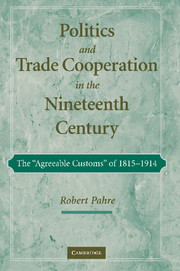Book contents
- Frontmatter
- Contents
- List of Figures
- List of Tables
- Preface
- POLITICS AND TRADE COOPERATION IN THE NINETEENTH CENTURY
- PART ONE COOPERATION AND VARIATION
- PART TWO DOMESTIC POLITICS AND TRADE POLICY
- 2 Conceptualizing and Measuring Trade Policy
- 3 A Political-Support Theory of Trade Policy
- 4 State Capacity, Fiscal Concerns, and the Tariff
- 5 Political Institutions and Tariffs
- PART THREE POLITICAL SUPPORT AND TRADE COOPERATION
- PART FOUR NORMS AND COOPERATION
- PART FIVE CONCLUSIONS
- References
- Index
3 - A Political-Support Theory of Trade Policy
Published online by Cambridge University Press: 08 December 2009
- Frontmatter
- Contents
- List of Figures
- List of Tables
- Preface
- POLITICS AND TRADE COOPERATION IN THE NINETEENTH CENTURY
- PART ONE COOPERATION AND VARIATION
- PART TWO DOMESTIC POLITICS AND TRADE POLICY
- 2 Conceptualizing and Measuring Trade Policy
- 3 A Political-Support Theory of Trade Policy
- 4 State Capacity, Fiscal Concerns, and the Tariff
- 5 Political Institutions and Tariffs
- PART THREE POLITICAL SUPPORT AND TRADE COOPERATION
- PART FOUR NORMS AND COOPERATION
- PART FIVE CONCLUSIONS
- References
- Index
Summary
“The elected National Assembly stands in a metaphysical relation, but the elected President in a personal relation, to the nation.”
– Karl Marx (1852/1963: 33)This chapter lays the foundation for the theoretical model used throughout this book, the theory of political support. Work in the political-support tradition has long been a common minority approach in economics, but for some reason has never caught on in political science.
We can consider the choice of model on theoretical, historical, or pragmatic grounds. Some models are theoretically attractive, perhaps because they are parsimonious or because they link up well with approaches to related topics. Marxism, rational-choice, and other similarly broad approaches to political economy share these advantages. At the other end of a spectrum of generalizability, some historical features compel us to a particular kind of model. One would not model the Hundred Years War with Weberian bureaucracies nor the Cold War through feudal patron-client relations in Washington (though this latter option is more tempting). Finally, pragmatic considerations might point in one direction or another.
The choice of the model developed here reflects such theoretical, historical, and pragmatic concerns. It would be shocking if all these considerations clearly favored one particular model. Let me argue more modestly that the theory of political support meets each concern reasonably well.
Explaining trade cooperation among 50 countries over the course of a century clearly requires a theory flexible enough to say something about countries of varying size, trade patterns, and political institutions.
- Type
- Chapter
- Information
- Politics and Trade Cooperation in the Nineteenth CenturyThe 'Agreeable Customs' of 1815–1914, pp. 66 - 104Publisher: Cambridge University PressPrint publication year: 2007



